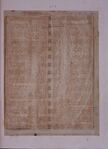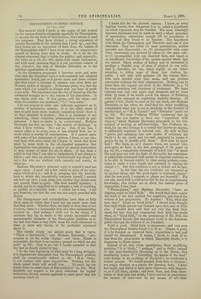Theosophists on Their Defence
The remarks which I made in the pages of this journal on the various theories advanced, especially by Theosophists, to account for the facts of Spiritualism, have served at least two purposes. They have elicited a strong expression of opinion favourable to the attitude that I took up; and they have drawn out an exposition of faith from the leaders of the Theosophists which I have every reason to congratulate myself on having been able to study. It is by far the clearest statement that is before the public; and, especially, the letter on p. 68, No. 285, states with much elaboration, and with more precision than it is put anywhere outside of Isis Unveiled, the idea of Madame Blavatsky as to the spiritual organisation of man.
As the discussion progresses it becomes more and more clear that the Occultists have a well-reasoned and coherent speculative belief, just as it grows more and more evident that that belief is Oriental in essence, and alien from our Western habits of thought. It becomes plain, too, that the issue which it is possible to discuss with any hope of profit is not wide. The argument runs the risk of becoming like the celebrated wrangle as to the colours of the chameleon. It was black, said one. It was green, said the other; and when the creature was produced, “Lo!’ twas white.”
I do not propose to enter into elaborate argument as to matters of speculative opinion. It is the idlest waste of time to split hairs about matters respecting which there is no final standard of decision. But it is necessary to say something, where otherwise misconception would be perpetuated. I have no desire to be controversial. Madame Blavatsky has felt, she says, “the scratch of challenge” in what I have written. No; not so. But, if she has, I cannot affect to be sorry, since it has elicited from her so much which is worthy of consideration. If I cannot agree with some of her statements of opinion, I have, at any rate, read them with some relief, for I began to think that there must be some truth in the oft-repeated accusation that Spiritualists were pursuing a course of mental depravation to end, sooner or later for all, in idiocy. It has been a relief to find that I was able to understand, if not always to follow; and that my previous bewilderment was shared by not a few who are credited with capacity and sanity, as times go.
Madame Blavatsky’s personal reply to myself I need not argue upon. I must say a few words on some of the principles involved in it; and if, in jumping into the bramble bush to which she unpoetically compares herself, I scratch out both my eyes, I may jump into another that stands near and scratch them in again. She does herself injustice. I should not be so ungallant as to compare a lady to anything so prickly as a bramble bush. I called her a rose. I did not, however, say that the rose was not amply provided with thorns.
The discrepancies and contradictions have been so fully dwelt upon by others that I need not say much more than that they exist. Whether from our fault or from that of our teachers, there is a lamentable lack of a clear understanding between us. And perhaps I shall not be far wrong if I attribute that fog as much to the purely speculative and unsubstantial character of the Theosophist platform as to the fact that there is very little room for exact statement in what is mere airy theory, or for profitable argument about it.
This stands clearly out amidst much that is vague. “When a Spiritualist,” says Madame Blavatsky, pronounces to us the words ‘dogma’ and ‘facts; debate is impossible, for there is no common ground on which we can meet” (p. 63). That is so; but I hardly expected to find the fact so clearly stated by her.
“At the very beginning of what must be a long struggle, it is imperatively demanded that the Theosophical position shall be unequivocally defined (p. 62). ‘M.A. Oxon,’ is not content with mere suggestions. Nothing but the whole naked truth will satisfy him…. We must lay our theory down on exact lines of demonstration” (p. 63). Most decidedly my request is for plain definition for logical deductions, for the nearest approach to exact proof that the questions admit of, desire this for the plainest reasons. I know, as every logician knows, how dangerous it is to admit a hypothesis on which argument may be founded. The most seemingly innocent statement may be made to carry a whole mountain of speculation, substantial enough till its foundation is tested, and then found to be baseless. The hypothesis with which the Theosophists and Theorists start are of this character. They are either (1) mere speculations, neither provable nor disprovable; or (2) incompatible with some other statements put forward by others on the same side; or (3) incompatible with our observed facts, and based on an insufficient knowledge of the system against which they are aimed. These sources of fallacy may be warranted to produce a fruitful crop of error if allowed to run wild. And I, therefore, for one, stand rigidly on my determination to follow none of them into devious bypaths. I will wait with patience till the various Theorists have decided what they mean, and can produce reasonable evidence for their assumptions. Nothing can be fairer than the request put forth in the Editorial on p. 72 for some precision and exactness of statement. We must reiterate over and over again such demands, and we must abide by them if we would avoid the danger of frittering away all our strength on combating shadowy theories. At present if Col. Olcott be read on the one hand, and Madame Blavatsky on the other, we shall find the latter modifying considerably what was to me so shocking in the doctrine of annihilation, as u M.A. Cantab” and “Scrutator” point out (p. 92). We have Professor Wilder confessing that he neither has nor desires to have any “experience with doppels” which Madame Blavatsky propounds as the true method of arriving at self-knowledge. The Professor indeed, for one who belongs to a society that knows no dogma, is sufficiently dogmatic to astonish one. He tells us that “spirits just emerging into new modes of existence are likely to be too much and too well employed to render it proper for me to meddle with them.” How does he know that? The facts, so as I observe them, are against him. And again we have in the last paragraph of his paper on pp. 89, 90, a remarkable statement of belief that44 at death the soul goes out with the light of the spirit, but sometimes is sufficiently enveloped with earthy or corporeal particles as to be able to become visible to clear, seeing persons, sometimes to make a voice heard, and certainly to impinge the thought (?). But this condition is not or should not be lasting.... In due time the two (entities) are separated as by another dying, and the good repair to heavenly places.” And the non-good, I suppose, to places not heavenly! For one who starts with a confession that he has no experimental knowledge, this strikes me as about the naivest piece of dogmatism I ever read.
“Theosophists,” says Madame Blavatsky, “have no dogmas, exact no blind faith.” She would have been nearer the truth if she had omitted her negatives, and stated the reverse of her proposition. No dogmas! Why, what else have they? Exact no blind faith? I should have thought that their whole system was founded upon that, and on little else. I should have said that not only was faith their creed, but that they had transmuted their faith into works when, in “blind faith,” on the pretensions of Mr. Fell, the Theosophical Society first announced itself to the American public through the address of its President.
Faith is good. Blind faith is dangerous; and very soon the Theosophical Society found it to be so. Dogma is good, if it be founded on observed facts; dogmatism is bad, and should be discouraged. It seems, I think, to most of us <... continues on page 4-230 >
Editor's notes
- ↑ Theosophists on Their Defence by Moses, W. S. (signed as M. A. (Oxon)), London Spiritualist, No. 288, March 1, 1878, pp. 98-9
Sources
-
London Spiritualist, No. 288, March 1, 1878, pp. 98-9


